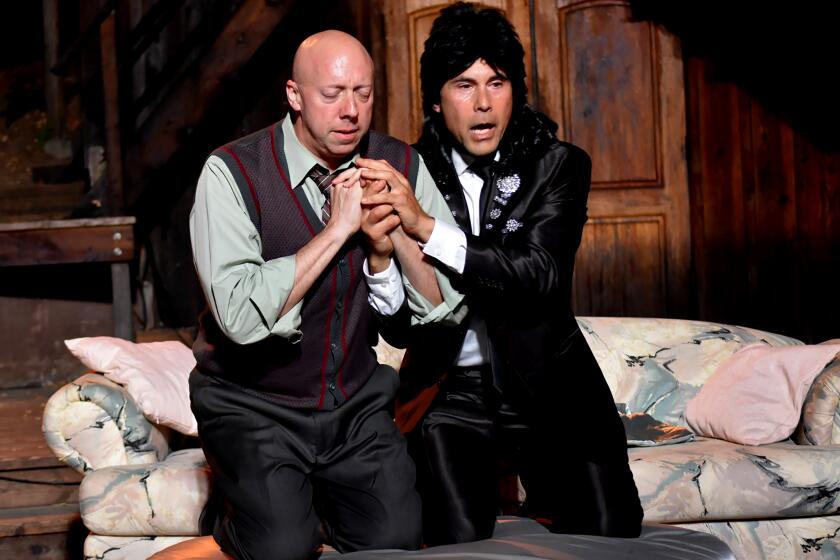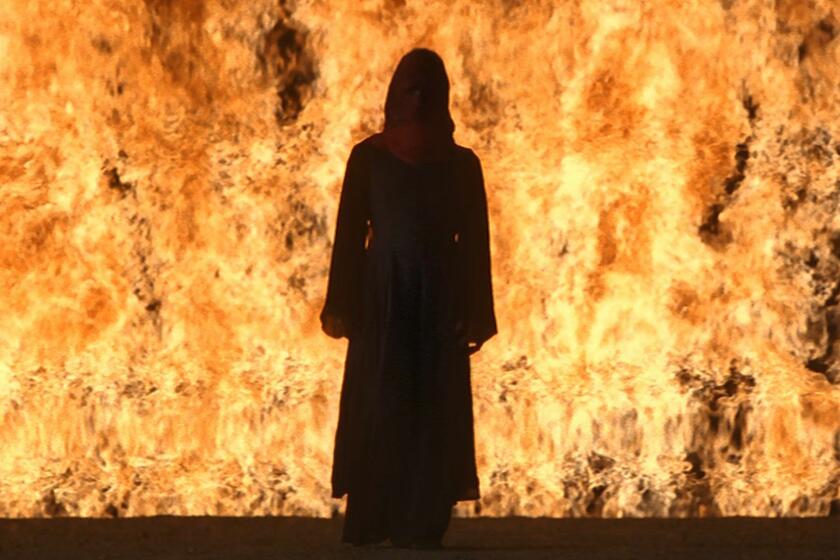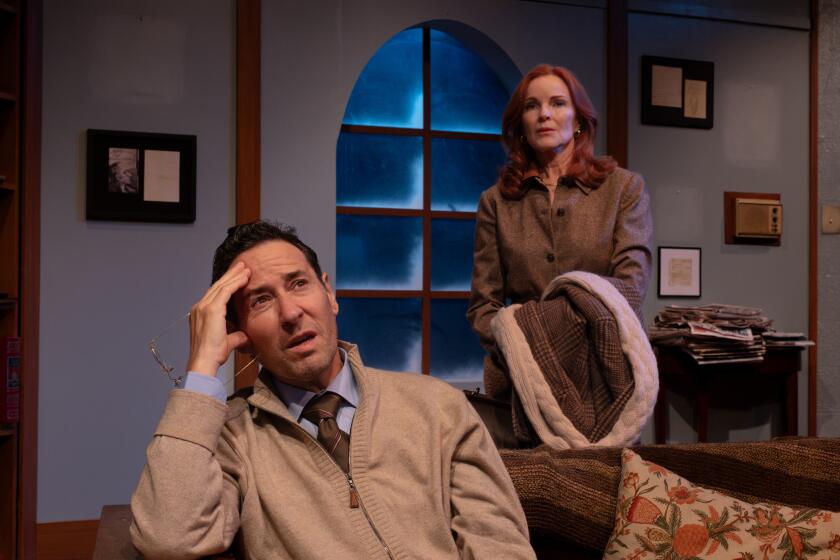HWANG : 24-Karat Effort
No new play gets onstage without undergoing a form of group surgery known as “play development.” This is the cutting and pasting, the fierce debating, the arduous rewriting, the cosmetic buffing and polishing demanded of the playwright by a theater company’s arbiters before finally being presented to an audience as the finished product of a single mind.
It’s often a hellish experience for the playwright. But when David Henry Hwang’s “Golden Child” opens Jan. 10 at South Coast Repertory in Costa Mesa, fresh from its New York premiere, the play will have had the rare advantage of a spawning ground he might describe as Development Heaven.
The production has the backing of two top regional theaters (SCR, which commissioned the play, is co-producing it with the New York Public Theater); the collaboration of an acclaimed director familiar with the methods of the commercial theater on and off Broadway (James Lapine, whose prizes include Tonys and Pulitzers); and a major grant to help ease the way ($50,000 from the Kennedy Center Fund for New American Plays--$40,000 to SCR, $10,000 to Hwang).
“This has been as good an experience as any show I’ve worked on,” the 39-year-old playwright, best known for “M. Butterfly,” said by phone recently from New York. “It is one of the least stressful experiences with a new play, and I’m proud of what we’re putting on the stage.”
“Golden Child,” largely a memory piece based in part on the playwright’s family history, tells a multi-generational story seen through the prism of cultural and religious change.
Hwang, who arrived here Thursday in time for the first preview of “Golden Child” tonight on the SCR Mainstage, said that since the New York production, which received mixed-to-positive notices, he has done “a fair amount of rewriting” and Lapine has done “some restaging.”
“I don’t know what ‘a fair amount’ constitutes exactly,” Hwang said. “But we’re working on the young man [with whom the play begins] and the bookends--that is, the structural frame that takes place in the present.
“We’re particularly working on getting into the action of the play, which felt like it could be done more quickly than we did in New York. And I have some other changes to put into the second act as well.”
*
Unlike many playwrights, Hwang reads his reviews. In the case of “Golden Child,” he’s even taking some of the advice.
“It’s like anything else,” he said. “Whether you get criticism in the paper or from a friend, someone will say something that articulates a feeling you may have had but weren’t able to put your finger on.”
If this sounds unusual, it is even more striking to hear what Hwang, who also is a member of the President’s Committee on the Arts and Humanities, has to say about the creation of plays generally in the noncommercial American theater, where most of them are generated.
“The playwright needs to feel that the theater is committed to him or her and not just to the particular play,” he said. “Otherwise it seems like a scam.
“All these theaters come up to promising playwrights and say, ‘We’re really interested in your work. Please do something for us.’ But what they’re actually saying is: ‘Send us your play, and then we’ll decide whether we want to do it.’ That’s not real support,” he said. “That’s sniffing around. It’s the same way Hollywood sniffs around.”
The chief irony here is that the writer’s work--to say nothing of the writer--often ends up being treated with an almost identical lack of respect by institutions widely believed to be at opposite ends of the creative spectrum. One--the theater--operates on the assumption that a work of art can always be improved with enough advice, and the other--the movies--on the assumption that business, not art, is the point.
Hwang knows about the movies. He wrote the screenplays for the 1993 film version of “M. Butterfly” and for “Golden Gate” and is working on “Texas Guinan,” a vehicle for Bette Midler to be directed by Martin Scorsese.
“As someone who also does work in film,” Hwang said, “I feel one of the great advantages that we have in the theater is that it is still primarily a writer’s medium: There is no play without the playwright.”
This is not the case, of course, with movies. Nobody is more dispensable than the screenwriter, who by and large has been reduced to little more than a skilled worker on an assembly line.
“I understand why ‘development hell’ comes about in the film industry,” he continued. “We all sort of accept it as a premise. But in the theater? It’s really horrible, and it’s not like you’re being paid handsomely, either.”
*
The encouragement of new plays by nonprofit theaters and granting entities are good things, of course. But one of the unfortunate side effects has been the rise of “play development” as a self-perpetuating cottage industry.
“It’s development for the sake of development,” Hwang said. “Plays go through these hoops, get produced on a tiny stage for three or four performances as part of a festival, and that somehow fulfills the theater’s obligation to say to the funding entity: ‘We do new plays.’
“I don’t think that’s a good thing.
“The playwright wants the theater to produce his or her play and therefore wants to cooperate and fix it in such a way as to please the theater, and that is a sad situation. A play is supposed to be a writer’s vision. Instead we get plays that are the work of committees.”
August Wilson, the two-time Pulitzer Prize-winning dramatist, addressed a similar theme recently as a keynote speaker at Kennedy Center in Washington, where more than three dozen playwrights were gathered to celebrate the 10th anniversary of the center’s Fund for New American Plays. (Since its inception in 1986, the fund has awarded almost $3 million to theaters and playwrights toward the production of 59 new plays.)
“Writing is a solitary act,” Wilson began. “In theater from that solitary act of writing, which often means wrestling with Jacob’s angel at 3:30 in the morning, emerges the blueprint for a collaboration of many arts and sciences. . . .
“Whatever the results, there’s a truism of the theater which everyone recognizes and then, having acknowledged its truth, promptly forgets; and the truism is this: Until the playwright does his or her work, no one else in the theater works--not the director, the actor, the designer, the electricians, the people that build and paint the sets [and] hang the lights . . . the dramaturge, the stage manager, the ushers. . . .
“And yet, despite this truism, the playwright is often overlooked in the equation that makes up the American theater. In many instances, we have to battle to get our name on the marquees, to get approval of the director or even consultation rights on the cast, design and marketing and any number of other issues that deal with bringing our vision and our art to fruition. . . .”
Wilson went on to excoriate the theater industry as a whole, declaring it “more concerned with audience development” than with backing its playwrights.
“Most new plays have gotten on the second stage with lower production values, which stigmatizes the playwright and consigns us to second-class status, while the mainstages have been reserved for museum productions of Shaw and Shakespeare and Chekov and Moliere. . . . We need to reverse that.
“How do we arrive at our ‘Streetcar Named Desire’ or our ‘Death of a Salesman’ if we are told in a variety of ways that we cannot accomplish that quality of work? . . . We are not junior playwrights waiting to grow up. We are American playwrights. This is our age . . . golden or not.”
The loudest applause and deepest nods of agreement came when Wilson remarked that “theaters that commission playwrights’ work need to produce the work. Commissions without obligations to produce the resulting work take away our voice and make us beholden to artistic directors and the whims of the subscription audiences who hold our stage hostage to the mediocrity of their taste.”
What did Hwang, who was also there, think of Wilson’s remarks?
“I’m glad someone came out that brashly and boldly for the power of the playwright,” he said, adding that he especially appreciated Wilson’s comments about theaters that fail to commit to writers for their body of work, preferring to cherry-pick instead.
“After ‘FOB,’ ” Hwang said, recalling his first produced play at New York’s Public Theater in 1980, Public founder “Joe Papp said to me, ‘I’ll produce anything you write.’ And he ended up producing my next four plays. A couple were one-acts! Two were pretty successful. Two didn’t do well. But the point is, he did them.
“It was an amazing gift to have this happen when I was in my early 20s. I learned a lot. It would have been very disappointing, surprising in fact, if I hadn’t. That process, that commitment, made me a better writer. And I hope it’s paying off now.”
* David Henry Hwang’s “Golden Child” begins previews tonight and opens Jan. 10 at South Coast Repertory, 655 Town Center Drive, Costa Mesa. Tuesday-Friday, 8 p.m.; Saturday, 2:30 and 8 p.m.; Sunday, 2:30 and 7:30 p.m. Ends Feb. 9. $18-$31 (previews); $28-$41 (beginning Jan. 10); pay-what-you-will performance Jan. 12, 7:30 p.m. (714) 957-4033.
More to Read
The biggest entertainment stories
Get our big stories about Hollywood, film, television, music, arts, culture and more right in your inbox as soon as they publish.
You may occasionally receive promotional content from the Los Angeles Times.






